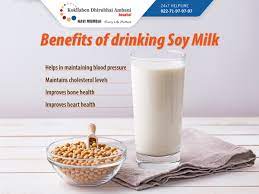The Incredible Benefits of Soya Milk Drink: A Nutritious Dairy-Free Alternative
Introduction:
In recent years, soya milk has gained immense popularity as a dairy-free alternative to traditional cow’s milk. This rise in demand is not coincidental; it’s due to the numerous benefits of soya milk that appeal to a wide range of consumers. Whether you’re lactose intolerant, a vegan, or simply looking to explore healthier beverage choices, soya milk is a versatile and nutritious option that can enhance your well-being in various ways.
Nutritional Profile:
Before delving into the specific advantages, let’s examine the impressive nutritional profile of soya milk. This will help you understand why soya milk is considered a powerhouse of essential nutrients. Soya milk is rich in:
Soy Protein:
Soya milk is an excellent source of plant-based protein, making it a crucial component of vegetarian and vegan diets. Soy protein is not only complete but also comparable to the protein found in animal products, making it a favorite among health-conscious individuals.
Calcium:
Just like cow’s milk, soya milk is fortified with calcium. This mineral is essential for maintaining strong bones and teeth, which is a topic we’ll delve into in more detail later in this article.
Health Benefits:
Soya milk offers a wide array of health benefits that can have a positive impact on your overall well-being. Here are some of the key advantages you can expect from including soya milk in your diet:
Heart Health:
Soya milk is known to be heart-friendly due to its low saturated fat content. Consuming soya milk can help reduce LDL cholesterol levels, which is beneficial for cardiovascular health. It’s a natural way to promote a healthy heart.
Bone Health:
Thanks to its calcium content, soya milk supports and maintains strong bones, reducing the risk of conditions like osteoporosis. This is especially valuable for individuals who are lactose intolerant or prefer a plant-based diet.

Lactose-Free Advantage:
One of the standout features of soya milk is its lactose-free nature. Lactose intolerance, a common condition affecting millions, can lead to digestive discomfort after consuming dairy products. Soya milk steps in as a welcome alternative. It’s entirely devoid of lactose, making it a gentle option for those with lactose intolerance.
Lactose intolerance occurs when the body lacks the enzyme needed to digest lactose, the natural sugar found in cow’s milk. This deficiency can lead to symptoms such as bloating, diarrhea, and abdominal pain after consuming dairy. Soya milk, being plant-based, spares you from these discomforts, making it a fantastic choice for individuals with lactose intolerance.
Plant-Based Protein:
In today’s wellness-conscious world, many are embracing plant-based diets for their numerous advantages. Soya milk plays a pivotal role in this shift towards plant-based living, offering a substantial source of protein without the need for animal products. It’s a versatile and delicious way to meet your protein needs without compromising your dietary choices.
Soy protein, the primary protein found in soya milk, is complete, containing all the essential amino acids your body needs. This completeness makes it a valuable addition to the diets of vegans and vegetarians. Additionally, soy protein is known to be highly digestible, ensuring that your body efficiently absorbs the nutrients it provides.
Weight Management:
For those on a weight management journey, soya milk can be a valuable ally. If you’re looking to shed a few pounds or simply maintain a healthy weight, the low-calorie nature of soya milk makes it a desirable choice. Unlike cow’s milk, which can be higher in calories, soya milk allows you to enjoy a creamy, satisfying beverage without an excessive caloric load.
Furthermore, soya milk is free from cholesterol, making it a heart-healthy selection. Combined with its protein content, which helps keep you feeling full, it can support your weight management goals effectively. This makes soya milk a smart inclusion in your dietary regimen if you’re focusing on maintaining or achieving a healthy body weight.
Hormone Regulation:
One often-overlooked benefit of soya milk is its potential to help regulate hormones. Soya milk contains natural compounds known as phytoestrogens, specifically isoflavones. These compounds can have estrogen-like effects in the body. For some individuals, especially women, this can be advantageous.
During menopause, women often experience a decrease in estrogen levels, leading to various symptoms like hot flashes and mood swings. The isoflavones in soya milk may help alleviate some of these symptoms by mimicking the effects of estrogen. This has led to the exploration of soya milk as a natural remedy for menopausal discomfort.
Antioxidant Properties:
Soya milk boasts impressive antioxidant properties. Antioxidants are substances that help combat harmful free radicals in the body, which are linked to various chronic diseases and the aging process. The antioxidants found in soya milk, such as vitamin C and isoflavones, can help protect your cells from oxidative stress.
These properties extend beyond skin-deep benefits; they contribute to overall health and well-being. Regular consumption of soya milk can potentially enhance your body’s ability to fend off oxidative damage, bolstering your long-term health.
Bone Health:
A robust skeletal system is crucial for overall health and mobility. Soya milk plays a significant role in supporting bone health, much like traditional dairy milk. It’s fortified with calcium, a mineral essential for maintaining strong bones and teeth.
For those who are lactose intolerant or choose a vegan lifestyle, soya milk becomes an invaluable ally in preventing conditions like osteoporosis. Osteoporosis is characterized by fragile bones and an increased risk of fractures, which can be prevented or mitigated by ensuring an adequate intake of calcium. Soya milk provides a dairy-free route to achieving this.
Allergen-Free:
For those with nut allergies, finding a milk alternative can be a challenge. Many popular plant-based milk alternatives, such as almond milk and cashew milk, are derived from nuts, making them unsuitable for individuals with nut allergies. Soya milk comes to the rescue as a nut-free milk option, providing a safe and delicious alternative for those with nut sensitivities.
Its allergen-free nature extends its versatility, making it suitable for a broader audience. Whether you’re allergic to nuts or simply prefer to avoid them, soya milk offers a peace of mind, allowing you to enjoy a nutritious milk alternative without any concerns about nut cross-contamination.
Delicious Recipes:
Incorporating soya milk into your diet is not only about reaping the health benefits but also about savoring delightful flavors. Soya milk serves as a versatile ingredient in the kitchen, lending itself to a wide range of culinary creations.
Soya Milk Smoothies:
Start your day with a refreshing soya milk smoothie. Blend it with your favorite fruits, such as berries, bananas, and mangoes, for a nutritious and satisfying breakfast option.
Creamy Soups:
Soya milk can be used to create creamy and dairy-free soups. Whether it’s a classic tomato soup or a comforting potato leek soup, soya milk adds a velvety texture.
Hormonal Health:
Soya milk’s influence on hormonal health goes beyond its benefits for menopausal women. Phytoestrogens found in soya milk may have a positive impact on hormone regulation for both men and women. Research suggests that these compounds can help balance hormones, potentially reducing the risk of certain hormone-related conditions, such as breast and prostate cancers.
While more research is needed to fully understand the extent of these benefits, incorporating soya milk into your diet may contribute to a healthier hormonal balance, making it a wise choice for individuals concerned about long-term health.
Immune System Support:
Maintaining a strong immune system is crucial for warding off illnesses and staying healthy. Soya milk, rich in essential nutrients like vitamins and antioxidants, can play a part in supporting your immune system. The vitamins and minerals found in soya milk, such as vitamin C and zinc, are known for their immune-boosting properties.
By regularly including soya milk in your diet, you can help fortify your body’s defenses, reducing the risk of common infections and promoting overall well-being. It’s a tasty way to give your immune system the support it needs.
Weight Management:
Weight management is a top priority for many, and soya milk can be an effective tool in your journey to achieve and maintain a healthy body weight. Soya milk is naturally lower in calories compared to whole cow’s milk, making it an ideal choice for those looking to manage their caloric intake.
Moreover, the protein in soya milk helps you feel full and satisfied, reducing the temptation to snack on unhealthy options. This, combined with its low-calorie nature, makes soya milk a valuable asset in your weight management strategy. It allows you to indulge in a creamy beverage while supporting your weight-related goals.
FAQs related to soya milk
Q: Is soya milk suitable for vegans?
A: Yes, soya milk is a vegan-friendly, plant-based milk alternative.
Q: Is soya milk lactose-free?
A: Absolutely, soya milk is entirely lactose-free, making it a great choice for those with lactose intolerance.
Q: Can soya milk be used in coffee and tea?
A: Yes, soya milk is a popular dairy milk substitute in coffee and tea due to its creamy texture and neutral flavor.
Q: Does soya milk contain the same nutrients as cow’s milk?
A: Soya milk is often fortified with nutrients like calcium and vitamin D to match the nutritional content of cow’s milk.
Q: Is soya milk safe for individuals with nut allergies?
A: Yes, soya milk is nut-free and safe for those with nut allergies.
Q: Can soya milk help with weight loss?
A: Soya milk’s low-calorie and high-protein content can support weight management efforts.
Q: How does soya milk affect cholesterol levels?
A: Soya milk’s plant sterols may help reduce LDL cholesterol, promoting heart health.
Q: Is soya milk suitable for children and infants?
A: Soya milk can be suitable for children, but it’s important to consult a pediatrician for infants.
Q: Are there any side effects of consuming soya milk?
A: Soya milk is generally safe, but excessive consumption may lead to digestive issues in some individuals.
Q: Can I make my own soya milk at home?
A: Yes, you can make homemade soya milk using soybeans and a simple blender or soya milk machine.
Conclusion:
In conclusion, soya milk is much more than just a dairy-free alternative; it’s a nutritional powerhouse with a multitude of benefits. From promoting heart health to aiding in weight management, soya milk caters to a diverse range of dietary needs and health goals. It is an excellent choice for those with lactose intolerance, individuals seeking a plant-based protein source, and anyone looking to enhance their overall well-being.




